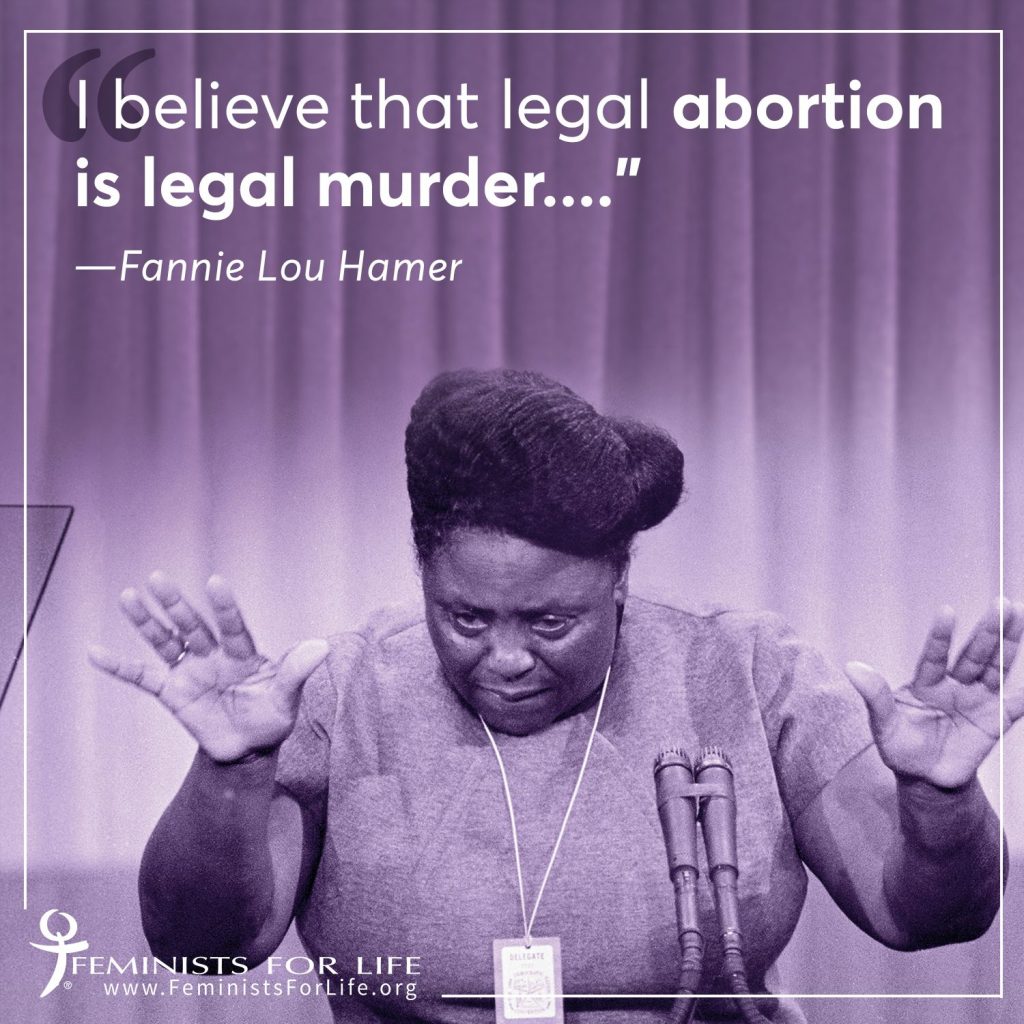
“And let’s go behind civil rights to human rights, because I don’t know the depths of civil rights, but I do know the depths of human rights, to protect any human being….”
We remember Fannie Lou Hamer, who died this day 44 years ago. Lauded for her fearless civil rights activism, many people still do not know that Hamer was as passionate in her defense of the unborn as she was in her pursuit of racial justice.
On October 6, 1917, Hamer was born to poor Black sharecroppers in rural Mississippi, the youngest of 20 children, and she started working for the family at just 6 years old. At the age of 12, she dropped out of school to care for her aging parents. By age 13, she was picking 200 to 300 pounds of cotton a day, despite suffering from polio. Although she never received a formal education after that, Hamer was an avid reader and loved spelling bees, poetry, and Bible study.
Hamer early on wisely connected abortion with eugenic attempts to exterminate people of color, because she knew the wound of such racist machinations personally: In 1961, Hamer became one of the thousands of African-American women forcibly sterilized by the government, a procedure euphemistically called a “Mississippi appendectomy.” Hamer and her husband had so dearly wished to become parents but had the ability to bear biological children robbed from them, so they adopted four children, including two of their own grandchildren when their son-in-law returned from the Vietnam War disabled. Tragedy would strike the Hamers yet again when one of their daughters died of internal hemorrhaging after she was denied admission to the local hospital because of her mother’s activism.
Hamer toured across the country to speak, including at many colleges and universities. Like Feminists for Life today, Hamer knew that it was important to get out her message to the next generation of leaders in the civil rights, feminist, and pro-life movements. Hamer was mocked for her appearance, her speech pattern, and her lack of a formal education by intellectuals and other public figures — both Black and White. But others saw through the superficial and admired Hamer as the leader she was; in 1964, Tougaloo College, a Historically Black College in Mississippi, awarded her an honorary degree.
During her opening remarks in a 1970 address to Goucher College, Hamer said, “I was born 53 years ago in Montgomery County and was the 20th child of 20 children. My mother and father, from one marriage, had six girls and 14 boys. So, you know, I’m glad that they wasn’t talking about… the legalized abortion, because if they had been talking about that then, maybe I wouldn’t be here tonight. So I’ll always somehow fight that, in my way, because maybe some other children would come up doing some of the things that I’m doing.”
Hamer would return to Tougaloo in the summer of 1971 and again use her platform to condemn the taking of unborn life. In a short but powerful speech titled “Is It Too Late?” Hamer tackled many topics, including how much men were valued and needed in the Black community, especially with so many young men conscripted in Vietnam. She said that abortion “amounts to genocide. I believe that legal abortion is legal murder….”
Fannie Lou Hamer was only 59 when she died this day in 1977. Her health was severely compromised and never fully recovered following a severe beating she underwent in Winona, Mississippi, in 1963, in an attack on her and other civil rights activists on their way home from a voter registration workshop in South Carolina. But Hamer achieved more in less than six decades than most of us could ever hope to in six centuries, a testament to her unyielding dedication to and faith in the cause of human dignity for all. As she herself put it, “Hate won’t only destroy us. It will destroy these people that’s hating as well.”





